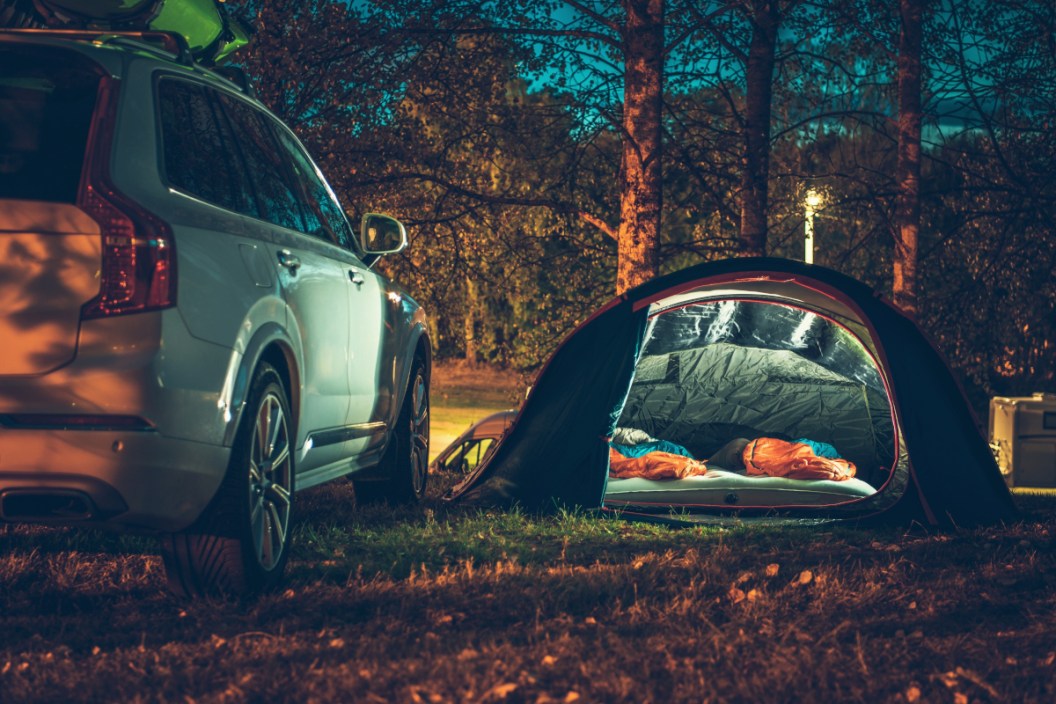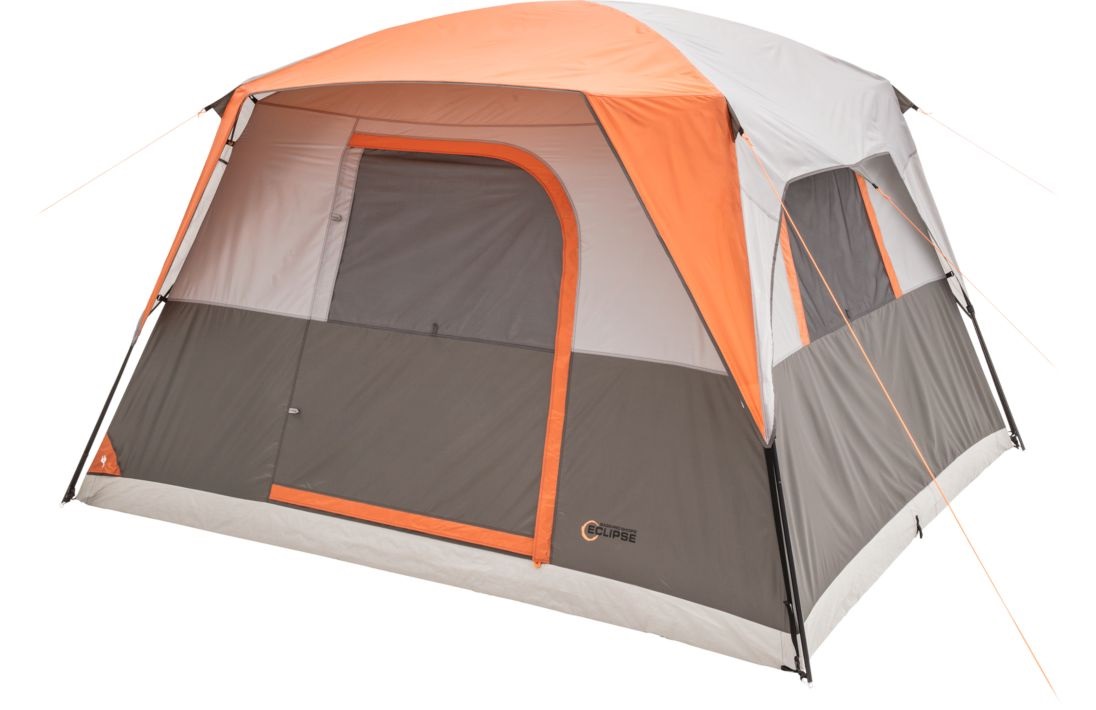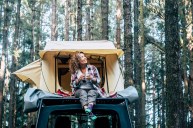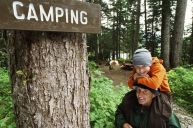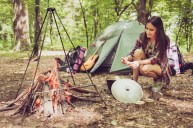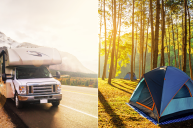Here is how to make the most of a car camping trip.
Everyone loves escaping deep into the backcountry of their favorite National Park or other BLM land. Sleeping in a small tent or even in the open in a sleeping bag with nothing but the light of the stars and maybe a good headlamp to illuminate the vast, wild areas around you is a great way to connect with nature.
While getting away from it all is great, there is something to be said for designated camping areas, picnic tables and restrooms nearby.
Think of car camping as a step somewhere between extreme roughing it and being more in connection with nature than a hotel. Our car camping tips will help you get the most out a simplified outdoor experience.
What is car camping?
There is often some confusion by just what is meant by the phrase 'car camping.' We will define it simply as camping where you close to your vehicle through the whole experience. Car camping can be RV or tent camping in a designated state-owned area with numbered campsites. Sometimes it refers to simply sleeping in your vehicle along forest service roads.
See our full guide on "dispersed camping" for more information on that free camping style. One thing to keep in mind is that with car camping, you will likely have more supplies like a full camp kitchen or an air mattress or sleeping pad to soften the hard ground and make for a more peaceful night's rest.
The other great thing about car camping is the availability of toiletries and rest rooms. Most state and federal campgrounds have decent bathroom and shower facilities that make camping more pleasant, especially for family members who may not been keen on the idea of roughing it.
Equipment for car camping
The great thing about camping out of your vehicle is that you do not need the latest and greatest in camping gear to do it. Especially on public lands that offer access to water, electricity and toilet facilities. However, if you are camping within 20 feet from where you are parking, I recommend going larger for tents. I have three tents myself. Two are smaller and suited for backcountry. My third tent is 10x20 feet and has a seven-foot ceiling. The larger one is much more comfortable for this style of camping. The high ceiling makes it easy to get dressed or undressed too. Tents like this are usually within the $150-200 range, so they will not break the bank. My general feeling for car camping is that you might as well go big or go home. It is not like you're going to be trekking this stuff miles into the wilderness, so tent and gear weight is a non-factor.
Our list of camping gear includes mostly items for food preparation. We recommend bringing along:
- Camp stove
- Propane canisters
- Matches/lighter/fire starter
- Cooler
- Dishes/glasses/pots/pans/cookware
- Drinks
- Food
- Napkins/paper towels
- Rope/cord
- Duct tape
- Bungee cord
- First aid kit
- Lantern
- Flashlight
- Headlamp
- Tarp (For a plethora of uses.)
- Hatchet/axe
- Knife/multi-tool
- Soap
- Shampoo
- Towels/bath gear
- Sanitary wipes
- Extra clothing (Always pack something warm, just in case!)
- Extra pair of footwear
- Camp chairs
- Camp table (If no picnic tables are available.)
- Trash bags
- Air mattress/pad/cot
- Phone charger
- Toilet paper
- Hand sanitizer
These are just some of our basic suggestions for camping essentials. Consider the place you will be staying. In some places you can get away with less depending on where you are staying. You might not need as many items staying on a modern campsite at a local state park. On the other hand, you may go all out. I have a friend who likes to bring a small fridge with her when she camps. She plugs it in and keeps it right there in the tent with her, stocked with cold ones. That is an extreme example, but you are allowed to be a little more creative than you would be on a backpacking trip in this style. I have another friend who simply packs a hammock for car camping. Everyone's definition of "everything you need" is going to be different.
One thing to keep in mind is to buy your supplies ahead of time. Many campgrounds have stores, but they will often charge you an arm and a leg for basic camping gear that can be had for much less at the local Walmart. Always take trash bags with you to practice leave no trace principles. It does not matter that it is a staffed campground with a full-time grounds crew. Clean up the fire pit, pick up your garbage and try to leave the area nicer than you found it.
Also, remember in bear country to either store your food in your vehicle or hang it from a tree. Just because there is a heavy human presence when car camping does not mean these animals will not wander in to your favorite getaway looking for a snack. That can put quite the damper on your first car camping trip when a bruin decides to make the outdoor adventures more exciting than anticipated.
One last tip we have is to make a camping checklist before your trip. The last thing you want is to get to your camping or glamping spot only to discover you forgot the toilet paper and hand sanitizer. Local gas stations can be expensive if that's the only option for gear. Make sure you have everything you need the first time you pack.
How to pick a spot to camp
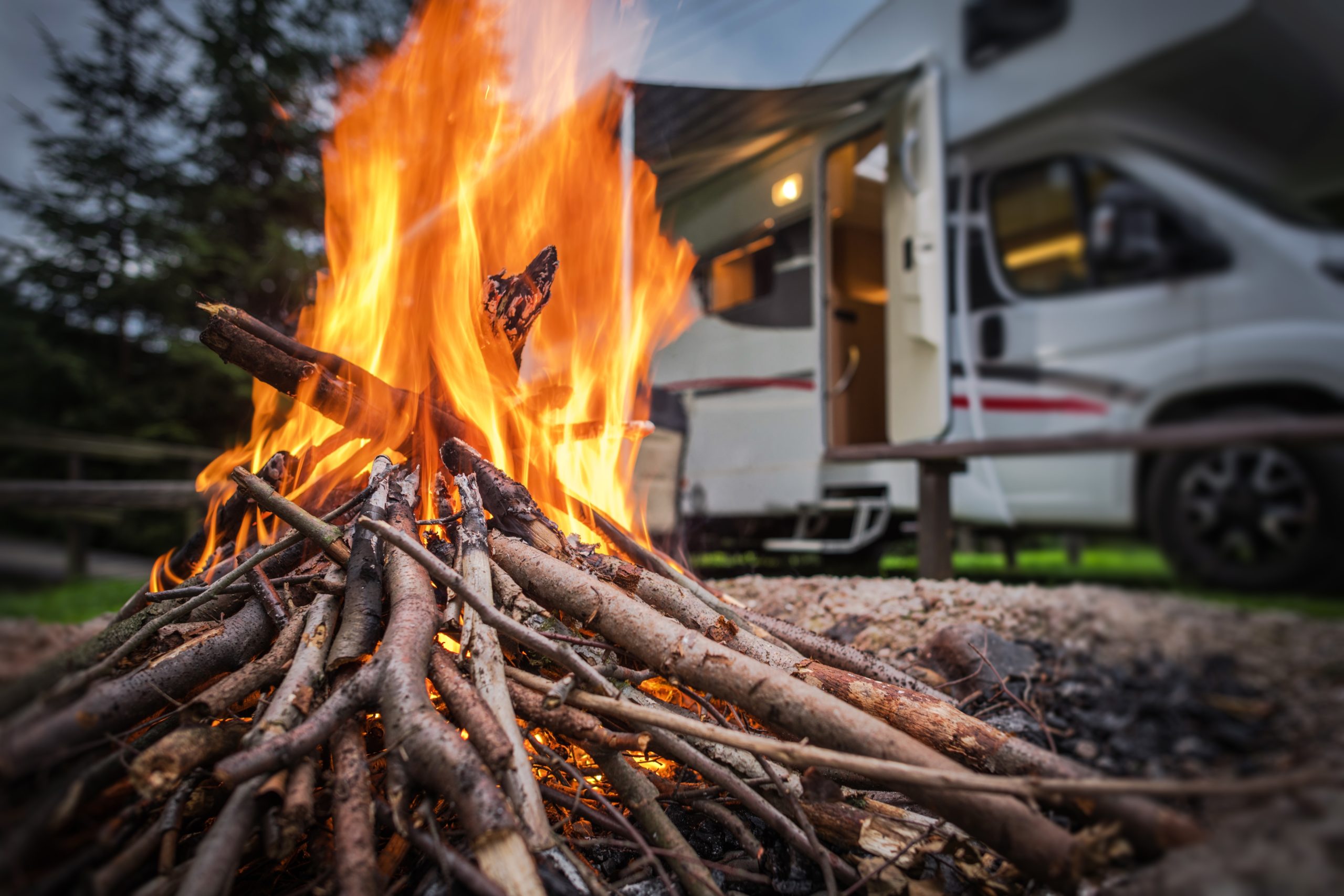
The Internet is a fantastic resource for finding simple car camping locations. Personally, I love Google maps and being able to click on reviews for each campground. People are usually very honest in these reviews and they will let you know the good along with the bad. In my experience, I have found most state-owned campgrounds to be among the finest I have ever stayed at.
Here in Michigan, the state has a solid campsite reservation system online for all their parks. One feature that is most helpful is that it often shows a photo of each campsite in the system. It allows you to quickly assess how close you will be to your neighbor. Check the satellite view of the campground if it is available too. There is no worse feeling than getting to the campground and finding your site is right next to the dumpsters.
In order to get the best sites at an established campground, it is best to plan early. Some campgrounds take their reservations up to a year in advance. Sure, that is a long way off to plan a camping trip, but if you want the ideal lakeside campsite, sometimes it is the only way to do it.
Another thing to consider is planning off-season or off-weekend. Many campgrounds that are packed June through August are empty in September through October. Often, those ideal camp sites that are booked all weekend will be free once Monday rolls around. If you can plan your vacation time then, your experience will be better for it.
As another option, check out sites like Hipcamp, which effectively acts at the "Airbnb of campgrounds." It will help you find car camping spots on private land without all the noise and disturbance of neighbors that some people hate about traditional campgrounds.
Sleeping IN your vehicle
The most literal form of car camping is sleeping within the confines of your vehicle. While many people might think that does not sound too pleasant, I have found it is exactly the opposite. Your vehicle can be quite a cozy place to spend the night. I have a 2011 Jeep Liberty SUV that is ideal for it. I fold down the back seats and it gives more than enough sleeping space for me and I am a little over six feet tall.
I do recommend a good sleeping pad or air mattress for this style though. It helps even out an otherwise uneven surface. I have even slept in my vehicle in campgrounds while running an extension cord into my vehicle to charge my phones and other electronics. It is more common than you may think.
In one case, I was camping in North Carolina and the campground I chose was near a busy road and quite noisy. My last evening, I tore down my tent early because rain was in the forecast and I did not want to dry out my tent the next morning. I slept in the Jeep that evening and the interior effectively drowned out the noise of that busy road for the best night's sleep of the trip.
The best part of sleeping in your vehicle is how simplified things are. Just park and you are set for the night. It takes minimal effort to set up or tear down. One quick safety tip, if you are sleeping in your vehicle, do not store the food there too if you are in bear country. You do not want to be woken up by a hungry bruin trying to get in.
Also, check local laws and regulations because some areas strictly forbid sleeping in a vehicle outside of an established campground. Getting woken up by a tap on the window by local law enforcement at 3 a.m. is not a pleasant experience!
Situations where car camping is ideal
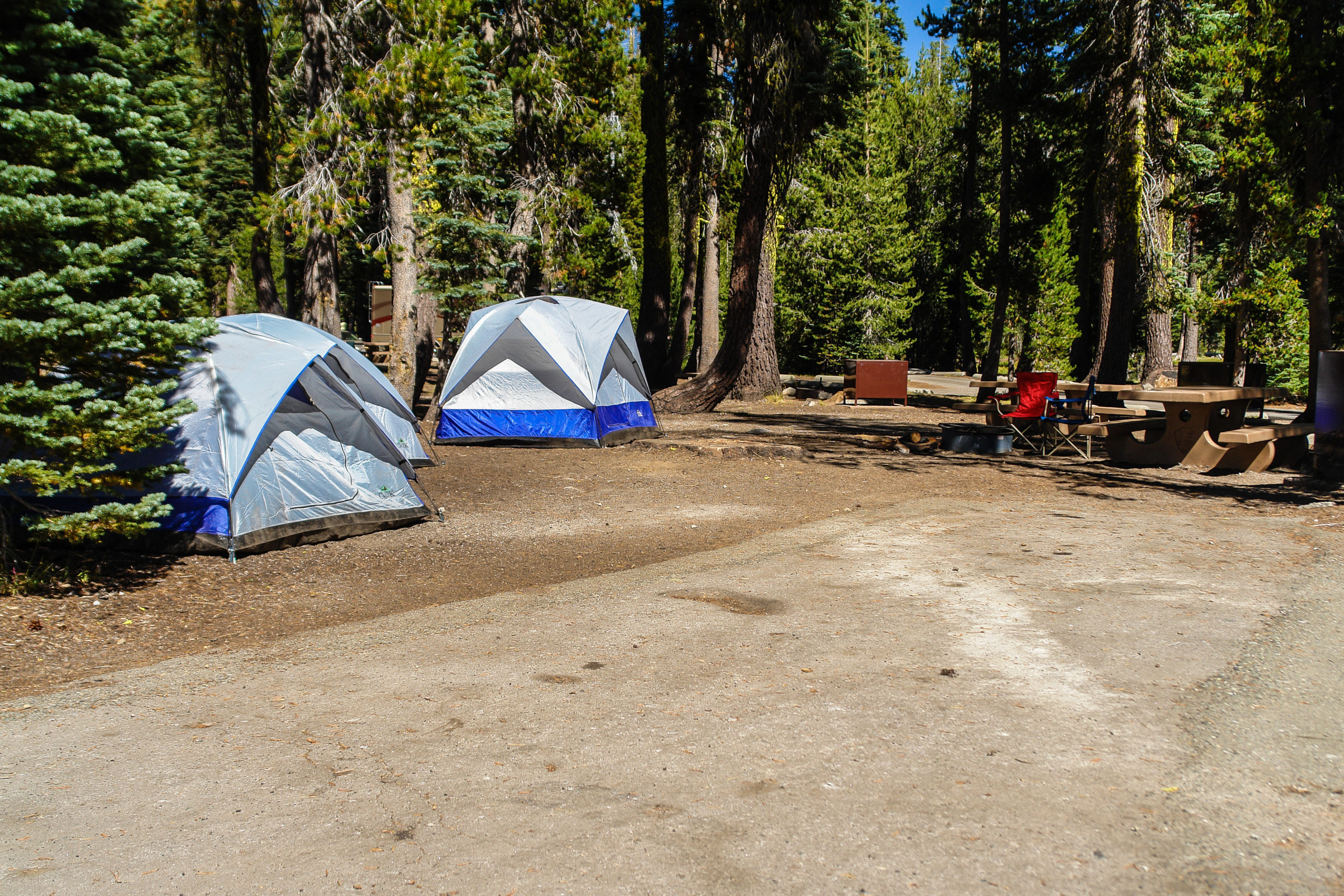
Car camping is the ideal solution for the camper who wants a camping experience that allows you to experience nature without going into full-on roughing it mode. Personally, I am an avid geocacher and I love to take road trips around the Midwest where I car camp. I spend the entire day out finding geocaches before retiring to the campground at the end of the day. I have done this several times for large events to save money. After all, $30 a night for an electric campsite is way more affordable than $100 a night for a hotel!
Backpackers have to meticulously plan every detail of their outdoor experience. That isn't the case for car camping. It is also ideal for weekend trips where you want an outdoor experience, but you also don't want to get too serious. Maybe you just want to enjoy roasting some marshmallows over the campfire with some friends and family in a state park an hour away from home. This style is perfect for that.
This style is ideal for those Friday, spur-of-the-moment fishing trips two hours away. Throw some fish cleaning supplies, a tent and a small grill in the truck and go. No need for the car camper to carefully weigh all their backpacking gear or prepare a series of meals for a hike for several days.
If you had previously only been a serious backpacker or wilderness hunter, give car camping a try this year. You might be pleasantly surprised at how much fun you have!
For more outdoor content from Travis Smola, be sure to follow him on Twitter and check out his Geocaching and Outdoors with Travis YouTube channels.
NEXT: 10 TOP PICKS FOR FAMILY CAMPING TENTS
WATCH
